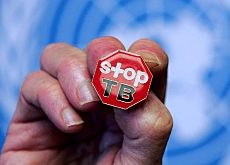World TB Day plea to tackle disease

Swiss experts have called for healthcare workers to be better protected from tuberculosis (TB) as part of the global fight against the disease.
Speaking at a symposium in Switzerland to mark World TB Day, doctors, nurses and infectious disease specialists highlighted the growing risk to staff in prisons, hospitals and laboratories in developing countries of contracting the infectious bacterial disease.
Jean-Pierre Zellweger, of the Swiss Lung Association that organised the event in Münchenwiler near Bern, said: “TB is not a problem in western Europe but it is in developing countries and in many other parts of the world. It is a huge public health problem that has not been solved.”
The latest research from the World Health Organization (WHO) found there were 9.2 million new cases of TB in 2006 and an estimated 1.5 million people died from the disease that year.
The WHO Global Tuberculosis Control 2008 report showed that instead of improving, progress in the diagnosis and control of TB was slowing down: the average rate at which new TB cases were detected increased by six per cent between 2001 and 2005, but halved in the next year.
New WHO guidelines for the protection of healthcare workers in high-risk areas were discussed at the Swiss Tuberculosis in the Workplace, Risks and Prevention symposium and will be distributed widely in the coming months.
In the past year, experts have found that healthcare workers in some countries have become increasingly worried about catching TB and many were being infected, said Zellweger.
“I personally participated in a survey in a Romanian hospital where we noticed that many healthcare workers had been contaminated by TB. Because of all these fears, justified or unjustified, we wanted to address this topic,” he said.
“Even if in some countries like Switzerland the risk is extremely low, it is low firstly because there are very few cases, and secondly because the cases are managed correctly. And thirdly, because the safety measures, for instance in laboratories, are good.”
Rates soar
To prevent the germ spreading, areas need to be well ventilated and patients suspected of having TB have to be isolated. But where this is not the case, the number of TB infections can be up to 50 times higher.
The new WHO guidelines will urge hospitals, refugee centres, prisons and hospitals in countries where the disease is highly prevalent to make protection of staff a priority and will outline safety measures.
But it still remains just one part of the overall picture in combating TB worldwide, Zellweger added.
“Lethal combination”
Essential goals of the coming years will be to step up research for new drugs and resolve the increasing number of drug-resistant cases where patients do not take all their medicines regularly for the required period, he said.
“WHO estimates that each year there are about half a million new cases that cannot be treated with the current drugs. The last good, efficient drug against TB was launched in 1964,” said Zellweger told swissinfo.
“We need people active in research and for the pharmaceutical industry to be interested in TB. There is movement and there is hope but it will be another five years before new drugs are available.”
In the year ahead, the WHO will also be highlighting the need to address the “lethal combination” of TB and HIV, which is fuelling the TB epidemic in many parts of the world.
HIV-positive people are particularly vulnerable to TB and in turn HIV helps to spread TB in the general population. In 2006, around 700,000 TB patients were HIV-positive and 230,000 of the 1.5 million people killed by TB were infected with the Aids virus.
Testing of TB patients for HIV has greatly increased in recent years but needs to more than double to meet the WHO goal of 1.6 million people tested annually by the end of 2015, the WHO says.
Addressing the issue on World TB Day, Jorge Sampaio, UN Special Envoy to Stop TB, said: “TB is a leading cause of death among people living with HIV/Aids.
“Several countries have shown that targets relating to TB/HIV are achievable and have put in place measures that will have an impact on the lives of those most at risk. But this is a restless battle. We still need to do much more and much better.”
swissinfo, Jessica Dacey
TB is an infectious bacterial disease typically attacking the lungs and spread through close, prolonged personal contact.
An infected person spreads the bacteria by coughing, sneezing or talking.
Symptoms commonly include a persistent cough that is dry and sometimes with traces of blood, night sweats, shortness of breath, high temperature and weight loss.
World TB Day marks the moment Robert Koch announced his discovery of the TB germ on March 24, 1882, and is held to remind the medical and worldwide community of the significance of the disease.
TB trails only Aids as the world’s leading killer among infectious diseases. About 14.4 million people had TB in 2006, among which were 9.2 million new cases, the WHO said.
The rate of tuberculosis incidence fell slightly worldwide for a second straight year in 2006, but there were still 9.2 million new cases and the disease killed 1.7 million people,
By region in 2006, Africa had the highest TB rates while Asia had the most cases. By nation, India had the most cases, followed by China, Indonesia, South Africa and Nigeria, according to a WHO report based on data from 202 countries and territories.
Around 520 tuberculosis cases were recorded in Switzerland in 2006. Around two-thirds of those infected with the disease were foreign residents.
The emergence and spread of drug-resistant germs makes treating TB much harder and could make it even deadlier. Drug-resistant TB is caused by inconsistent or partial treatment, when patients do not take all their medicines regularly for the required period.

In compliance with the JTI standards
More: SWI swissinfo.ch certified by the Journalism Trust Initiative














You can find an overview of ongoing debates with our journalists here . Please join us!
If you want to start a conversation about a topic raised in this article or want to report factual errors, email us at english@swissinfo.ch.